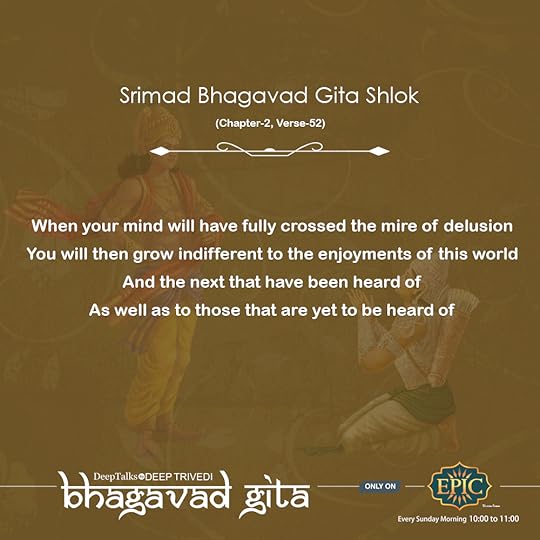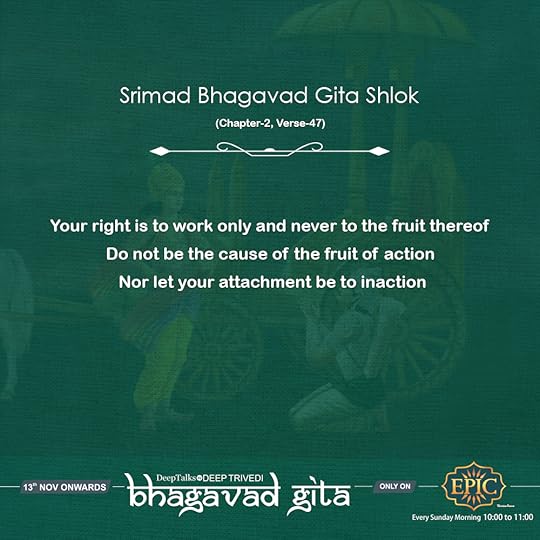Deep Trivedi's Blog, page 22
December 1, 2016
Just as fire is covered by smoke, mirror by dust and embryo by the amnion, so is knowledge covered by desire – #BhagavadGita Shlok (Chapter-3, Verse-38)

Meaning of the #Shlok
In this sutra, Krishna is explaining the principle of knowledge. Knowledge is anyway a popular topic of discussion across the world. Everybody is very keen to acquire knowledge and become wise. But the question is, in what does knowledge lie… in the scriptures, in school-colleges or in voluminous books? Krishna is saying that knowledge doesn’t lie in any of these! A human being’s soul is the most knowledgeable of all in this world. But just the way the fire gets hidden behind smoke, the reflection is unclear on a dust-covered mirror and the womb is hidden by after-birth; in the same way, the knowledge of a human being’s soul remains hidden by a human being’s desire.
Here the word ‘desire’ needs to be explained specifically. Don’t understand ‘desire’ to mean carnal attraction between a man and woman. I have often said that Krishna is speaking from a high stature; if you can’t rise to it then at least don’t bring it down to your level. There’s no wisdom hidden in celibacy. And anyway, in this Gita itself Krishna has said despite not having any lust in me I still behave in accordance with my worldly deeds. For, if I abstain from being around women because I don’t have any lust left in me and in future that is believed to be religion then I will be hailed as a hypocrite. Meaning, I will become the one responsible for the extinction of mankind. If everyone believes celibacy to be a way of life then in a century or two, won’t mankind be wiped out from the face of earth? And Krishna himself had married eight times; given birth to 56 children. Now, a righteous man like Krishna, will at least not tell others to do something which he himself isn’t doing. He’s not some religious leader who wants to further his ashram. He’s a doer, he has built Dwarka on his own efforts.
Anyway…here, by ‘desire’ Krishna means want. Because every want that is hidden with a human being compels him to do something or the other. And this compulsion of doing one’s deeds induced by one’s want is ‘desire’. Besides, if a person doesn’t have any want then he doesn’t have any reason at all to desire something. This establishes clarity with regards to desire. Now, let’s also understand what Krishna is referring to as ‘knowledge’. And for the sake of that just think, if someone doesn’t have any want in his mind won’t he do any of his deeds? Of course he will do it! And he will do it even better that the desirous ones. Take the example of Arjuna itself. Perhaps never was there a doer born who was greater than him. Then what is the difference between Krishna’s desire and our want? The difference is that those who don’t have to do any deeds to fulfil their own wants their deeds stem from the knowledgeable soul; whereas our deeds stem from our lust. So, you need to understand that basically these deeds which stem from the erudite soul is what Krishna calls ‘knowledge’. Hence simply put, understand that it is deeds itself which are the basis of knowledge and ignorance; the only difference is that the ignorant do their deeds only to fulfil their wants whereas the deeds of a knowledgeable person are springing forth selflessly and joyfully from his soul. And if I were to say this in Krishna’s language, all the good and bad deeds done to fulfil one’s wants are the sole ignorance of a human being, then whether those deeds are religious, social or worldly; a human being is doing all these deeds out of sheer ignorance only.
Therefore, to sum it up, Arjuna please understand that this deed which has befallen you in the form of this war, is a result of your want to acquire the kingdom, meaning it is the result of your ignorance. Hence, right now, you don’t ask at all about how you can gain knowledge. Firstly you endure this war which has stemmed from your ignorance. And once this war is over and done with, and if still the wish to gain knowledge is intact within you, then give up the various wants in your mind from which varied deeds are stemming. That’s it! Once these want-driven deeds have moved out then the knowledge present in your soul will surface before you. Then what has to be done by you will go on happening. Meaning, after that you will never be delusioned about “what should I do?” However, even to gain that knowledge, right now you need to fight in this war which has come forth because of your own ignorance… don’t try to escape from it by resorting to your want of gaining knowledge.
– Deep Trivedi
Watch #DeepTalks by Deep Trivedi on The EPIC Channel Every Sunday Morning 10 to 11
Share PostTwitterFacebookGoogle +1Email
November 29, 2016
All living creatures follow their tendencies, even the wise man acts according to the tendencies of his own nature. Of what use is any external restraint? – #BhagavadGita Shlok (Chapter-3, Verse-33)

Meaning of the #Shlok
In this sutra Krishna is saying something very remarkable! Krishna is saying that all human beings are in accordance with their own nature. And this nature of a human being isn’t formed suddenly in a day. Depending on how a human being has thought, done or lived, he begins to develop a psychology of his own. And then he is bound to doing all his varied deeds submitting to that psychology itself. If today this battle is taking place, then isn’t your desire of getting back your kingdom from the Kauravas responsible for it? If today this battle is taking place, then isn’t your failure in protecting Draupadi’s honour responsible for it? Hasn’t Draupadi’s stubbornness played an important role in fanning your internal family feud and taking it to the magnitude of this epic battle? Hasn’t Duryodhana’s ego added fuel to fire? Definitely because of you people’s stubbornness, foolishness and ego, the matter has escalated to the level of epic battle! Actually this is not something extraordinary; because each one of you has done, what you did, by submitting to your psychology. Just think, that when a human being has to do everything only by submitting to his psychology, then in that case how can anyone’s obstinancy about ‘not doing’ something help? …Hence, you simply fight in the war. This is the fruit of the seeds which your psychology has sown and going forward you will have to reap even more of it! And what do I say about you; a compassionate, knowledgeable person is also bound to strive according to his psychology. Just think, if a knowledgeable person would be free of all attachments at the psychological level, then would he even bother himself with trying to get back his kingdom from the Kauravas? No, right? But pay heed that he too is doing so by submitting to his own psychology. Understand that even this is not owing to his greatness, just the way what you did is not your fault; whatever and whenever you people did, even that was because of submitting to your psychology only. So tell me now, whether it is a wise person or a foolish one, if it is his psychology only which is doing everything, then what power does someone’s obstinence hold in such a case? Deviating from one’s psychology and doing something means falling to an even lower psychological level. But yes, if in future the psychology itself changes then that is a different case altogether! If truly from your heart you have no animosity towards the Kauravas or really you have no attachment for the kingdom, then it is a completely different scenario! But right now, just a moment ago you had entered the battled with great gusto; it is only on seeing the Kauravas’ army that the fear of death has risen within you! That is why you are mouthing such ideologies. But know this for sure, that despite propounding such ideologies, at the psychological level, you are in fact only a human being trapped in attachments. Therefore, considering your psychology, it is best for you to fight in the war, because the desire for the kingdom is still your ground reality today. Now in such a scenario, where is the scope for you to be obstinate about not fighting in the war? Hence, stop asking meaningless questions and forfeit propounding words of wisdom… simply fight the war.
– Deep Trivedii
Watch #DeepTalks by Deep Trivedi on The EPIC Channel Every Sunday Morning 10 to 11
Share PostTwitterFacebookGoogle +1Email
November 22, 2016
All actions are being performed by the modes of Nature. The fool, whose mind is deluded by egoism thinks, “I am the doer” – #BhagavadGita Shlok (Chapter-3, Verse-27)

Meaning of the #Shlok
In this sutra, Krishna is telling Arjuna that in reality, all deeds, in every manner are performed by virtue of Nature. It’s not as if only the earthquake or tsunami is an act of Nature, in fact all the ups and downs in a human being’s life also arise out of their own natural virtues. Because attachment is a part of your psychology, attracted by ego you are thinking that it is ‘you’ who is fighting this war or that victory or defeat will be yours. But in reality, this is merely a circumstance of all the human being’s collective psychology in which you are bound to do whatever the circumstance demands of you. And when you are not doing anything, but are bound to do everything, then why don’t you give up a doer’s attitude which says ‘will I win or lose’? Why don’t you simply become a medium of whatever is happening, and whatever will happen? Why are you unnecessarily burdening yourself with doing or getting something done?
– Deep Trivedi
Watch #DeepTalks by Deep Trivedi on The EPIC Channel
Every Sunday Morning 10 to 11
Share PostTwitterFacebookGoogle +1Email
November 21, 2016
Arjuna, as the unwise act with attachment, so should the wise man with a view to maintain the world order act without attachment -#BhagavadGita Shlok (Chapter-3, Verse-25)

Meaning of the #Shlok
In this shloka, Krishna is telling the wise men that physically, even the learned should do the same deeds which the foolish people, controlled by attachments, unwillingly do. If they do not do so and go on fault-finding in other people’s deeds, then slowly, even if it is unknowingly, instead of leaders they become digressers, who lead people away from doing their deeds. And if we look up the history of mankind, most of the learned people have even done so; and if this wasn’t proving to be enough then various scriptures, blowed out of proportion different types of ordinary simple deeds and even termed them as sin. And that is the reason why since centuries mankind has been deluded about doing its deeds. Whereas in reality the importance is of the feeling in one’s mind, what is done by the body is merely like an act! Hence, rather than fault-finding with deeds that people do physically, the learned need to teach them how to desist deeds at the psychological level. As a matter of fact, Krishna has married and fought wars too; he even nursed a fondness for good clothes and was also a slave of his taste buds; and when the need arose he even made effective use of skills like lying, deceit and cheating. But what needs to be understood is, Krishna did all these deeds only physically; at the psychological level he would always remain detached from these deeds.
– Deep Trivedi
Watch #DeepTalks by Deep Trivedi on The EPIC Channel Every Sunday Morning 10 to 11
Share PostTwitterFacebookGoogle +1Email
November 16, 2016
The man dwelling on sense-objects develops attachment for them, from attachment springs up desire and from desire (unfulfilled) ensues anger -#BhagavadGita Shlok (Chapter-2, Verse-62)

Meaning of the #Shlok
In this shloka, Krishna is beautifully explaining the principles behind a human being getting angry based on their psychological points. Krishna is saying, oh Arjuna! A human being’s anger is in reality a by-product of his acts born out of ignorance, hence you please understand the whole process. Actually, when a person focuses upon something, in time he starts getting attracted towards it. Once attracted, he desires to acquire it. Until this point, it is not a problem; but then in case for some reason his desire is not fulfilled or he is faced with a roadblock on the path of fulfilling that desire, then he becomes angry. Right now, even you are concentrating upon life-death or victory-defeat, because of which you are possessed by the fear of death or desire for victory. And the Kaurava’s large army as well as warriors like Bhishma, Karna and Drona appear as roadblocks in your quest. And because you have no reason to be angry with them, you are getting upset. Understand this matter very deeply: the psychological truth is that sorrow, worry and frustration are not primary emotions. The primary emotions of a human being are only anger and love. But a human being can vent his anger only on someone weaker than him, so on coming face-to-face with a powerful opponent he finds himself powerless. It is simply because he feels so powerless that his anger translates into unhappiness, worry and frustration. Simply put, if the Kauravas were weak, then neither would Arjuna ask ‘Krishna’ so many questions nor would he speak of running away from the battle field. And he would definitely not waste time in mouthing words of wisdom… without a moment’s wait he would have come down on the Kauravas in full force.
Hence, you please understand this psychology explained by Krishna. And based on the same principle analyse your anger, frustration, worry and sorrows, etc. If you want to do away with them then beware of the main cause, which is, ‘focussing on the wrong thing’. Focussing on the wrong things is the basis of all your desires. And if you harbour wrong desires and they remain unfulfilled, then anger is bound to manifest! And then, on whom will you be able to vent out this anger…? No one! So, with passing time, this suppressed anger will eventually transform into sorrow, fear, worry, frustration and other such perverted emotions.
-Deep Trivedi
Watch #DeepTalks by Deep Trivedi on The EPIC Channel
Every Sunday Morning 10 to 11
Share PostTwitterFacebookGoogle +1Email
November 15, 2016
He who is unattached to everything, and meeting with good and evil neither rejoices nor recoils, his mind is stable – #BhagavadGita Shlok (Chapter-2, Verse-57)

Meaning of the #Shlok
Directly attacking Arujna’s present state of mind, Krishna is saying in this shloka that in the present you are experiencing sorrow because your mind is not equanimous. But the ones whose mind is equanimous, good-bad or favourite-unfavourite mean nothing to them… But this is not the case withyou. Sometimes, you ask how can I kill my teacher, uncles or grandfathers, and at other times, you seek to know who shall win this war! But Arjuna, he whose mind is stable doesn’t worry about all such things while doing his deeds. Detaching themselves from everything else, they remain attached only to their soul, and due to this, no matter whether the outcome of their deed is good or bad, they neither feel happy nor unhappy about it! Therefore, in the manner of fighting in this war, you too do your deed wholeheartedly but whatever may its outcome, accept it as the will of Nature. If you win, don’t feel too elated and if you lose, don’t nurse any sorrow about it. By doing so you will become equanimous.
– Deep Trivedi
Watch #DeepTalks by Deep Trivedi on The EPIC Channel
Every Sunday Morning 10 to 11
Share PostTwitterFacebookGoogle +1Email
November 14, 2016
When your mind, confused by hearing conflicting statements will rest steady and undistracted in meditation of God, you will then attain Yoga (everlasting union with God) – #BhagavadGita Shlok – (Chapter-2, Verse-53)

Meaning of the #Shlok
In this shloka, Krishna is telling Arjuna, who is constantly proliferating the knowledge of the scriptures, that when your mind, which is currently deluded by reading different scriptures, becomes one with God, meaning your soul and remains in that level, then at that very moment you shall attain Yoga. Because the truth is known only to a human being’s own soul; and the truth which manifests from there, cannot be rivalled by words of the scriptures. So, the moment in which you become successful in listening to the voice of your soul, understand that now you have developed an eternal connection with God. Then no matter what task you have to perform, there will be no need for you to seek the support or disapproval of the scriptures. Each time and in every situation, from your soul itself the guidance to do what is right will appear. Thus, the one who establishes such constant communication with his soul doesn’t even need to ask anyone or understand from someone else what needs to be done, let alone listen to someone else.
– Deep Trivedi
Watch #DeepTalks by Deep Trivedi on The EPIC Channel every Sunday Morning 10 to 11
Share PostTwitterFacebookGoogle +1Email
November 13, 2016
When your mind will have fully crossed the mire of delusion. You will then grow indifferent to the enjoyments of this world. And the next that have been heard of as well as to those that are yet to be heard of. – #BhagavadGita Shlok – (Chapter-2, Verse-52)

Meaning of the #Shlok
Feeling surprised on seeing his extremely disillusioned mind, Krishna is telling Arjuna, who is repeatedly citing the scriptures and expressing his concern over heaven-hell, that all these talks are filled with worldly-attachment. And because right now you are trapped in the attachments of the outcome of the war, you are getting attracted towards such thoughts! But whenever your understanding transcends above such attachments of life, at that time on your own, you will separate yourself from these possessions and promises related to earth-heaven which you have heard or happen to hear. Because then you will know that heaven and hell are merely a state of mind. If a human being is trapped in attachments then at that very point in time he is enduring hell; and if he is living with a mind free from attachments, then in this life itself he is surely experiencing the pleasures of heaven. And when you will understand this truth, then you will not worry at all about the after-death imaginary heaven-hell.
– Deep Trivedi
Watch #DeepTalks by Deep Trivedi on The EPIC Channel from November 13, 2016 onwards
Share PostTwitterFacebookGoogle +1Email
November 11, 2016
Endowed with equanimity, one sheds in this life both good and evil. Therefore, strive for the practice of this Yoga of equanimity. Skill in action lies in the practice of this Yoga. – #BhagavadGita Shlok – (Chapter-2, Verse-50)

Meaning of the #Shlok
In this verse, Krishna is telling something really beautiful to Arjun, who is constantly bemoaning about sin and virtue on the basis of scriptures. He is telling him that don’t try to be pompous about your knowledge of the Vedas to a wise person like me and neither list out to me the sins and virtues. The truth is that the human being who is able to always keep his mental equanimity, renounces sin-virtue in this birth itself! Meaning, thereafter sin-virtue doesn’t remain the basis of his deed. And this is the fact! Just because killing someone is a sin, will you not attack a person outraging a woman’s modesty and defend her honour. In this attack, if he dies will that amount to committing a sin? No! Krishna is saying that a sinful or pious deed is not a physical act but is based on the emotional state of the mind. And the equanimous person who has made his thinking as, “my self-interest lies in the interest of others”, will he ever object to doing any deed? Why will he bother himself with the concepts of sin-virtue? Whatever he does will always be a ‘supreme act of virtue’.
Hence, oh Arjuna, you too come out of this cycle of sin-virtue and evoke the sentiment of equality within you. Equality means whether you die or someone else, whether you win the battle or Duryodhana, what difference does it make to you? And when winning or losing isn’t making any difference to you, then is it possible for you to be attached to its resulting happiness-sorrow? Right now the unhappiness that you are facing is because you do not wish to die. And this wish also includes in itself the death and defeat of the Kauravas. But if you accept everything as equal and leave matters to Nature’s justice then for sure you will instantly be free of this ‘bond of doing’ which is causing happiness-unhappiness.
– Deep Trivedi
Watch #DeepTalks by Deep Trivedi on The EPIC Channel from November 13, 2016 onwards
Share PostTwitterFacebookGoogle +1Email
November 10, 2016
“Your right is to work only and never to the fruit thereof, do not be the cause of the fruit of action. Nor let your attachment be to inaction.” – #BhagavadGita Shlok – (Chapter-2, Verse-47)

Meaning of the #Shlok
This aphorism is probably the most important psychology in the history of mankind. Krishna is saying that you surely have a right to work, but never over its result. And why should we lose even the slightest of energy over something which we have no right on at all?
This one teaching of Krishna is capable of making human life peaceful, successful and joyful. Today onwards pay heed that whenever any sorrow, worry or problems grip you, is it related to the deed or the outcome. At all instances you shall find that it was born out of the thoughts related to the outcome.
Now, this is one side of the story. Delve deeper… these outcomes are after all a result of what? Definitely, of doing the deed! It simply means that, as it materialises, the deed done by you itself determines its outcome. Meaning, if you desire the result to be good then do your deed in the best possible way. And when will the deed be done superlatively? Only when your focus is completely on the deed. And when will your attention be undivided? Only if the thought of the outcome doesn’t even cross your mind while doing the deed.
So Krishna is telling Arjuna that what’s your worry? …That neither should you die nor lose in the battle. And if either event is likely to occur then I should simply run away from the battlefield! …Meaning, you don’t mind the war, you are worried about dying or losing in it! But oh simpleton, you possibly can survive the battle and even win it! That is, to say, that all your wishes can surely be fulfilled. But when? Only when you forego all these worries and pay complete attention only to fighting in the battle… It is simple… the child, who wishes to top in his class, surely can. But when can this be possible? Only when he focuses on studying rather than standing first. But if he says that he will study only if there’s a guarantee that he will come first, then how can someone guarantee it without him putting in the efforts? And then if he says, in that case he shall not appear for the exams at all, then it is an absolutely frivolous statement!
And Arjuna, right now, you are saying something similar. Hence, my dear, go and fight in the battle putting aside all worry of the outcome. I promise that even without me guaranteeing it to you, you will surely be able to bring about the desired outcome. Honestly speaking, this teaching of Krishna is not limited to only the battle or an exam, but is in fact the calculation to be applied to anything that you desire in life. If your focus is on the deed rather than the end result, then you will achieve everything. On the other hand, if your attempts are driven by the result then all your energy will be utilised only in thinking about it or calculating the positive-negative effects. Then how will there be any energy left to do the deed that it will bring about the desired result? And this is what is worrying Krishna that if Arjuna keeps on thinking about the result then how will he be able to give his best in the battle? And if he doesn’t fight with his full potential, then how will he win the war? So, hereafter if you wish for success in life, then keep your eyes set on the deed and don’t think about the result at all! On behalf of Krishna, I guarantee you that you will definitely get the desired result!
– Deep Trivedi
Watch #DeepTalks by Deep Trivedi on The EPIC Channel from November 13, 2016 onwards
Share PostTwitterFacebookGoogle +1Email



